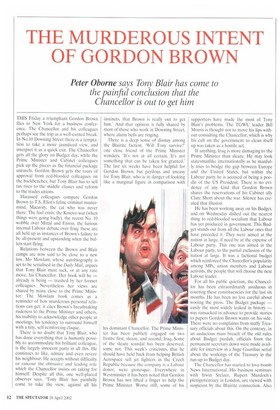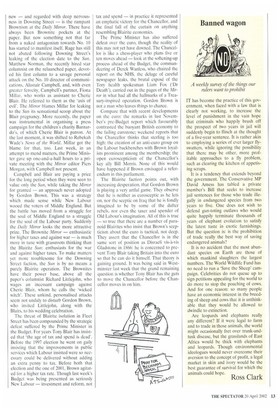Peter Obome says Tony Blair has come to
the painful conclusion that the Chancellor is out to get him
THIS Friday a triumphant Gordon Brown flies to New York for a business conference. The Chancellor and his colleagues perhaps see the trip as a well-earned break. In No.10 Downing Street there is a temptation to take a more jaundiced view, and interpret it as a quick exit. The Chancellor gets all the glory on Budget day, while the Prime Minister and Cabinet colleagues pick up the pieces as the financial package unravels. Gordon Brown gets the roars of approval from red-blooded colleagues on the backbenches, but Tony Blair has to sell tax rises to the middle classes and reform to the trades unions.
Harassed colleagues compare Gordon Brown to T.S. Eliot's feline criminal mastermind, Macavity, the cat who was never there. The fuel crisis, the Kosovo war (when things were going badly), the recent No. 10 wobble over Mittal and Enron, the furious internal Labour debate over Iraq: these are all held up as instances of Brown's failure to be all-present and upstanding when the bullets start flying.
Relations between the Brown and Blair camps are now said to be close to a new low. Mo Mowlam, whose autobiography is set to be serialised in the Daily Mail, argues that Tony Blair must sack, or at any rate move, his Chancellor. Her book will be — already is being — trashed by her former colleagues. Nevertheless her views are shared by many close to the Prime Minister. The Mowlam book comes as a reminder of how murderous personal relations can get: it cites Brown's breathtaking rudeness to the Prime Minister and others, his inability to acknowledge other people at meetings, his tendency to surround himself with a tiny, self-reinforcing claque.
There is no doubt that Tony Blair, who has done everything that is humanly possibly to accommodate his brilliant colleague, is the largely innocent party in all this. He continues to like, admire and even revere his neighbour. He accepts without difficulty or rancour the obtrusive and leading role which the Chancellor insists on taking for himself. Despite all this, one well-placed observer says, 'Tony Blair has painfully come to take the view, against all his instincts, that Brown is really out to get him.' And that opinion is fully shared by most of those who work in Downing Street, where alarm bells are ringing.
There is a deep sense of dismay among the Blairite faction. 'Will Tony survive?' one close friend of the Prime Minister wonders. 'It's not at all certain. It's not something that can be taken for granted.' The last six weeks have been helpful for Gordon Brown, but perilous and uneasy for Tony Blair, who is in danger of looking like a marginal figure in comparison with his dominant Chancellor. The Prime Minister has been publicly engaged on two fronts: first, sleaze, and second, Iraq. Some of the sleaze scandal has been deserved, some not. This week's criticisms, that he should have held back from helping British Aerospace sell jet fighters in the Czech Republic because the company is a Labour donor, were grotesque. Everywhere in Westminster it has been noted that Gordon Brown has not lifted a finger to help the Prime Minister. Worse still, some of his supporters have made the most of Tony Blair's problems. The TGWU leader Bill Morris is thought not to move his lips without consulting the Chancellor; which is why his call on the government to clean itself up was taken as a hostile act.
If anything, Iraq is more damaging to the Prime Minister than sleaze. He may look statesmanlike internationally as he manfully tries to bridge the gap between Europe and the United States, but within the Labour party he is accused of being a poodle of the US President. There is no evidence of any kind that Gordon Brown shares the reservations of his Cabinet ally Clare Short about the war. Silence has created that illusion.
He has been working away on his Budget, and on Wednesday dished out the nearest thing to red-blooded socialism that Labour has yet produced in government. This Budget stands out from all the Labour ones that have preceded it. They were aimed at the nation at large, if need be at the expense of Labour party. This one was aimed at the Labour party, to the partial exclusion of the nation at large. It was a factional budget which reinforced the Chancellor's popularity among MPs, union members and Labour activists, the people that will choose the next Labour leader.
For all his public quietism, the Chancellor has been extraordinarily assiduous in courting these constituencies for the last six months. He has been no less careful about wooing the press. The Budget package — easily the most widely leaked in history — was ransacked in advance to provide stories to papers Gordon Brown wants on his side. There were no complaints from stuffy Treasury officials about this. On the contrary, in an audacious mass breach of the old rules about Budget purdah, officials from the permanent secretary down were made available for interview in a huge Guardian serial about the workings of the Treasury in the run-up to Budget day.
The Chancellor has started to love-bomb News International. His business seminars with Irwin Stelzer, Rupert Murdoch's plenipotentiary in London, are viewed with suspicion by the Blairite connection. Also
new — and regarded with deep nervousness in Downing Street — is the rampant Brown ism at the Daily Mirror. There have always been Brownite pockets at the paper. But now something not that far from a naked antagonism towards No. 10 has started to manifest itself. Rage has still not abated following Downing Street's leaking of the election date to the Sun. Matthew Norman, the recently hired star columnist on the relaunched paper, devoted his first column to a savage personal attack on the No, 10 director of communications, Alastair Campbell, and, with even greater ferocity. Campbell's partner, Fiona Millar. who works as assistant to Cherie Blair. He referred to them as the `axis of evil'. The Mirror blames Millar for leaking to the Sun its sensational scoop about the Blair pregnancy. More recently, the paper was instrumental in organising a press campaign for the children's charity Barnardo's, of which Cherie Blair is patron. At the last moment, it was shifted to Rebekah Wade's News of the World. Millar got the blame for that, too. Last week, in an attempt to mend matters, the Prime Minister gave up one-and-a-half hours to a private meeting with the Mirror editor Piers Morgan, with Campbell not present.
Campbell and Blair are paying a price for the long period when they were seen to value only the Sun, while taking the Mirror for granted — an approach never adopted by Gordon Brown. This was a strategy which made sense while New Labour wooed the voters of Middle England. But the battle has moved from a struggle for the soul of Middle England to a struggle for the soul of the Labour party. Suddenly the Daily Mirror looks the more attractive prize. The Brownite Mirror — enthusiastic for higher taxes and against war — is much more in tune with grassroots thinking than the Blairite Sun: enthusiasts for the war and against higher taxes. To make matters yet more troublesome for the Downing Street faction, the Sun is by no means a purely Blairite operation. The Brownites have their power base, above all the paper's columnist Richard Littlejohn, who wages an incessant campaign against Cherie Blair, whom he calls the 'wicked witch'. These unkind, personalised attacks seem not unduly to disturb Gordon Brown, who invited Littlejohn, along with the Blairs, to his wedding celebration.
The threat of Blairite isolation in Fleet Street has been compounded by the strategic defeat suffered by the Prime Minister in the Budget. For years Tony Blair has insisted that 'the age of tax and spend is dead'. Before the 1997 election he went on gaily insisting that the improvements in public services which Labour insisted were so necessary could be delivered without adding an extra penny to tax. Before both that election and the one of 2001, Brown agitated for a higher tax rate. Though last week's Budget was being presented as seriously New Labour — investment and reform, not tax and spend — in practice it represented an emphatic victory for the Chancellor, and the final fall of the curtain on anything resembling Blairite economics.
The Prime Minister has also suffered defeat over the euro, though the reality of this may not yet have dawned. The Chancellor is like a chess-player who plans five or ten moves ahead — look at the softening-up process ahead of the Budget, the commandeering of Derek Wanless, who chaired the report on the NHS, the deluge of careful newspaper leaks, the brutal exposé of the Tory health spokesman Liam Fox (Dr Death'), carried out in the pages of the Mirror in what had all the hallmarks of a Treasury-inspired operation. Gordon Brown is not a man who leaves things to chance.
Compare that with recent developments on the euro: the remarks in last November's pre-Budget report which favourably contrasted the buoyant British economy to the failing eurozone; weekend reports that the Chancellor thinks that sterling is too high; the creation of an anti-euro group on the Labour backbenches with Brown loyalists prominent among the membership; the open euroscepticism of the Chancellor's key ally Bill Morris. None of this would have happened if Brown envisaged a referendum in this parliament.
The Blairite faction points out, with increasing desperation, that Gordon Brown is playing a very artful game. They observe that he is neither as eurosceptic as he lets on, nor the sceptic on Iraq that he is fondly imagined to be by some of the dafter rebels, nor even the taxer and spender of Old Labour's imagination. All of this is true — so true that there are a number of paranoid Blairites who insist that Brown's scepticism about the euro is tactical, not deep. They assert that the Chancellor is in the same sort of position as Disraeli vis-a-vis Gladstone in 1866: he is concerned to prevent Tony Blair taking Britain into the euro so that he can do it himself. That theory is gaining ground. It was being said in Westminster last week that the grand remaining question is whether Tony Blair has the guts to move the Chancellor before the Chancellor moves in on him.







































































 Previous page
Previous page